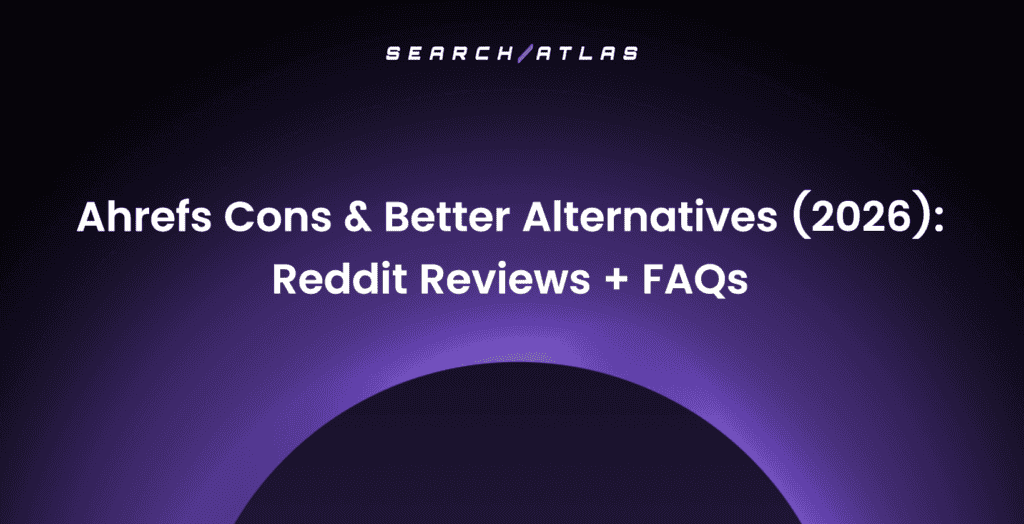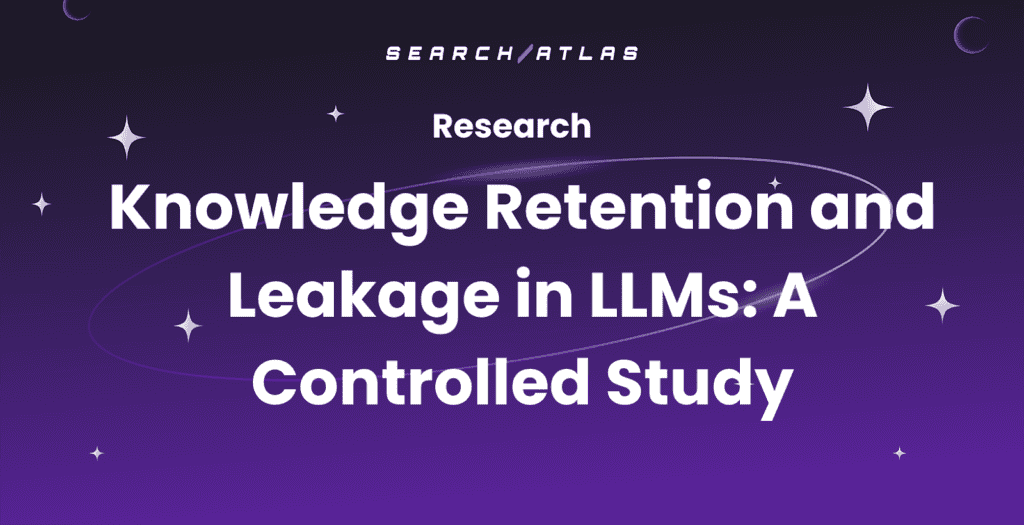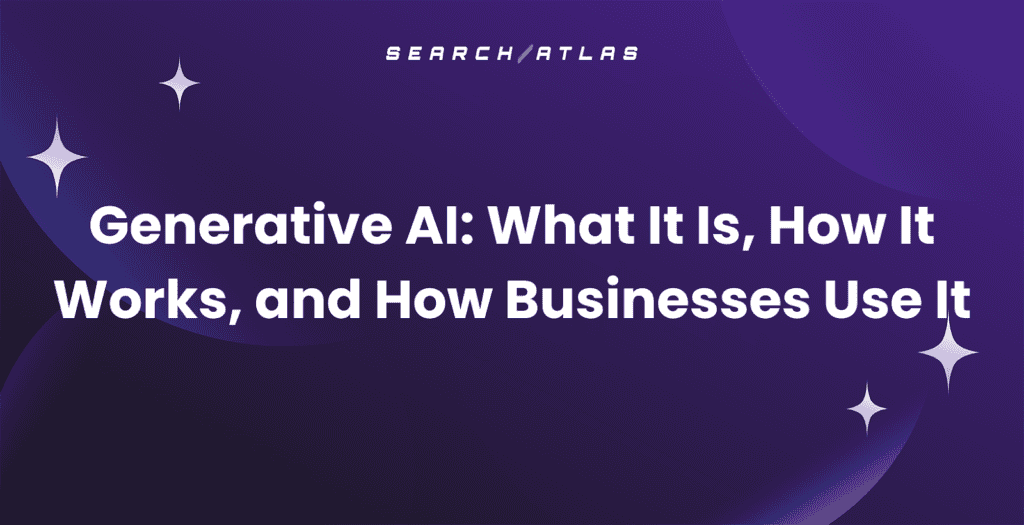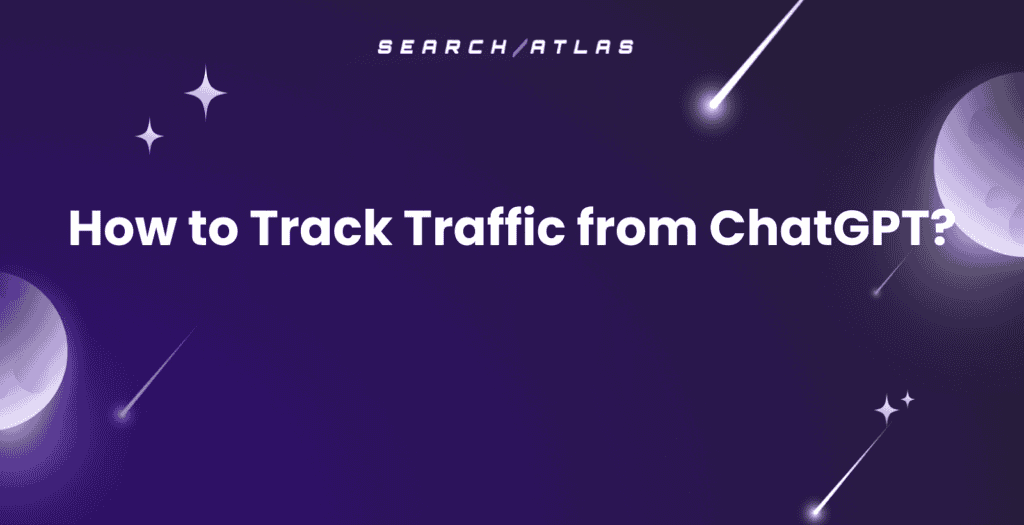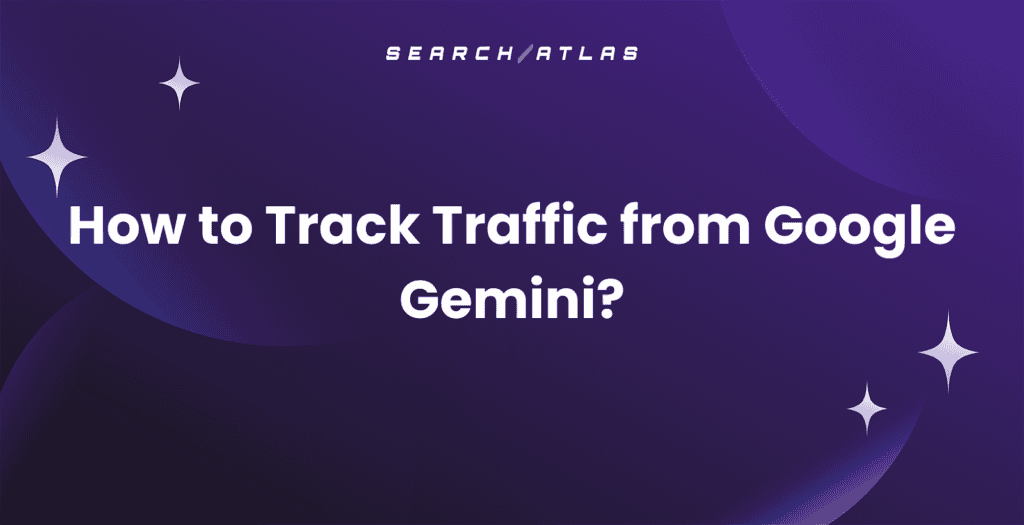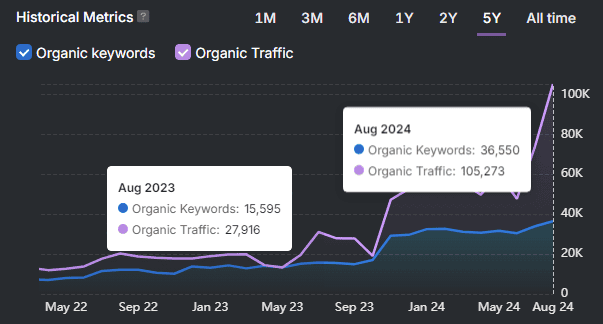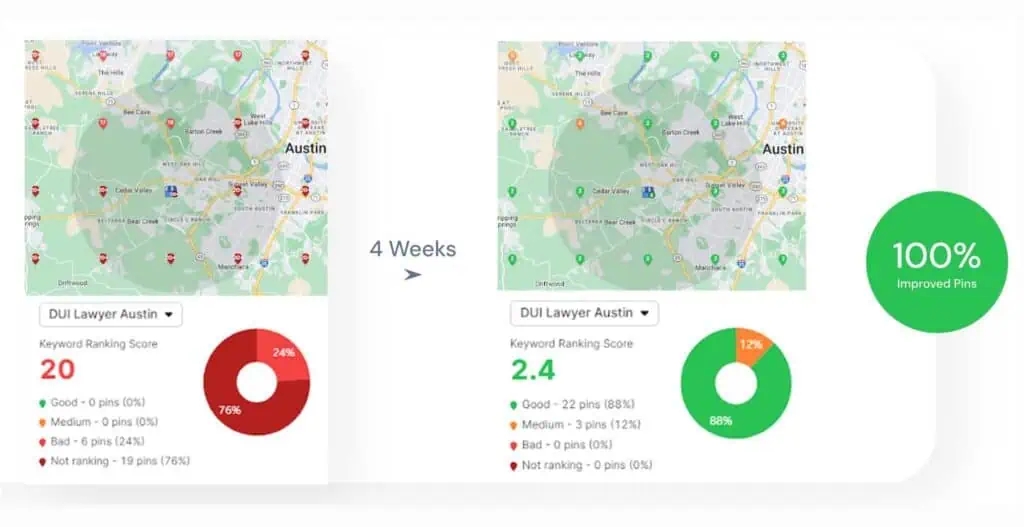SEO PowerSuite is a desktop-based SEO software suite designed to help users with keyword research, website auditing, backlink analysis, and link building. SEO PowerSuite targets beginners, small businesses, and budget-conscious users who prefer a one-time or annual payment model over expensive subscriptions. The key features of SEO PowerSuite are Rank Tracker, WebSite Auditor, SEO SpyGlass, and LinkAssistant.
SEO PowerSuite’s pricing starts with a free version offering limited functionality, while paid plans range from around $300 to $700 per year, depending on the license tier. A main pro of SEO PowerSuite is its cost-effectiveness, particularly for unlimited keyword tracking. Conversely, a main con of SEO PowerSuite is its outdated interface and slow performance on larger projects. This SEO PowerSuite software review will provide a detailed analysis of SEO PowerSuite’s features, pricing, pros, and cons to help you decide if it suits your SEO needs.
What is SEO PowerSuite?
SEO PowerSuite is a desktop-based SEO software bundle that offers four core tools for keyword research, website auditing, backlink analysis, and link building and outreach. The SEO PowerSuite Tool requires users to download and install the software, which may appeal to those preferring offline access or more control over data storage.
A noteworthy strength of SEO PowerSuite is its depth of data, especially in backlink analysis and technical site audits. Users can track keyword positions across multiple search engines, analyze on-page SEO factors in detail, and conduct competitive analysis with relative ease. However, the SEO PowerSuite’s user interface feels dated compared to modern SaaS SEO platforms, and the overall user experience may be less intuitive for beginners. Updates are frequent, but users must manually install them, which can disrupt workflows.
While SEO PowerSuite offers a one-time license model with optional maintenance fees, it lacks the collaborative and real-time features of other cloud tools. Reporting can be extensive, but customization options are somewhat rigid. Additionally, the SE PowerSuite software is resource-intensive, requiring a reasonably powerful machine to run smoothly, especially during large-scale audits.
The SEO PowerSuite dashboard can be a cost-effective option for advanced users or consultants managing multiple sites. However, agencies may find SEO PowerSuite’s limitations in scalability and team collaboration restrictive.
What is the History of SEO PowerSuite?
SEO PowerSuite was founded in 2004 by Aleh Barysevich and Viktar Khamiano. The SEO PowerSuite software originated in Belarus as four distinct desktop tools, each addressing a distinct SEO need. The SEO PowerSuite Tool filled a gap for users who needed robust, offline tools at a time when downloadable software was the standard.
Throughout the late 2000s and early 2010s, the SEO PowerSuite dashboard built a loyal user base, particularly among freelancers and small agencies. The SEO PowerSuite interface was recognized for its detailed reporting, flexibility in keyword tracking, and deep backlink analysis. However, SEO PowerSuite began to show its age, as the SEO industry evolved and more cloud-based platforms emerged. The lack of real-time syncing, browser access, and multi-user support increasingly stood out as drawbacks in a market that was shifting toward integrated, collaborative tools.
The SEO PowerSuite software has remained largely tied to its desktop infrastructure despite ongoing updates and improvements. This design choice has kept SEO PowerSuite from fully adapting to modern SEO workflows that rely on automation, API access, and cloud-based reporting. Additionally, the reliance on Java can lead to performance issues on certain operating systems, especially during heavy audits or data processing. While the SEO PowerSuite Tool still serves a niche audience, its slower pace of innovation compared to leading SaaS competitors has limited its appeal for larger teams and enterprise users.
Who is SEO PowerSuite Tool For?
The SEO PowerSuite Tool is for freelance SEOs, consultants, and small agencies that prefer one-time software purchases over ongoing cloud-based subscriptions. The SEO PowerSuite Tool appeals to users comfortable with desktop tools and those who value detailed offline reporting rather than always-on, real-time data access through the cloud.
However, the SEO PowerSuite software is less ideal for larger teams or agencies that require collaborative workflows, browser-based accessibility, or seamless project sharing across multiple users and devices. The SEO PowerSuite’s Java-based interface can be resource-heavy and occasionally sluggish, making it better for users with powerful machines and technical comfort. Moreover, those needing integration with modern marketing stacks, automation tools, or APIs may find SEO PowerSuite’s ecosystem relatively limited and outdated in today’s SEO environment.
What are the SEO PowerSuite Features?

There are 4 main SEO PowerSuite features, each targeting a core aspect of search optimization to help users manage rankings, site health, backlinks, and outreach. The 4 main features of SEO PowerSuite are discussed below.
1. SEO PowerSuite Rank Tracker
SEO PowerSuite Rank Tracker is a desktop-based application used to monitor keyword rankings across a wide range of search engines, including Google, Bing, Yahoo, Baidu, and YouTube. SEO PowerSuite Rank Tracker supports mobile and desktop tracking and allows location-specific rank checks at the country, city, or even street level. The SEO PowerSuite Rank Tracker Tool identifies SERP features like featured snippets and local packs, offering users data on how results appear across devices and regions.
The SEO PowerSuite Rank Tracker dashboard includes several keyword research functions, pulling suggestions from autocomplete, related searches, and competitor analysis. Recent updates introduced a Domain Analysis feature, which provides data on a domain’s estimated traffic, backlinks, and keyword rankings. A dashboard interface aggregates ranking and keyword metrics, but the layout can feel cluttered and less intuitive than modern SaaS tools. Integration with Google Analytics and Search Console is available, but setup requires manual steps and doesn’t sync as seamlessly as cloud-based platforms.
The SEO PowerSuite Rank Tracker interface’s core limitations stem from its desktop-only design. The SEO PowerSuite Rank Tracker software lacks any real-time syncing, multi-device access, or built-in collaboration, which restricts its usefulness for distributed teams or fast-paced environments. Users must rely on manual or scheduled checks to update rankings, which feels inefficient compared to cloud platforms that pull live data continuously. Moreover, the SEO PowerSuite Rank Tracker’s interface is dense, with a noticeable learning curve, and requires navigating multiple settings for basic tracking tasks. This slows down workflows rather than streamlining them.
To use SEO PowerSuite Rank Tracker, start by creating a project and entering your website and target keywords. Then select your preferred search engines and run manual or scheduled rank checks.
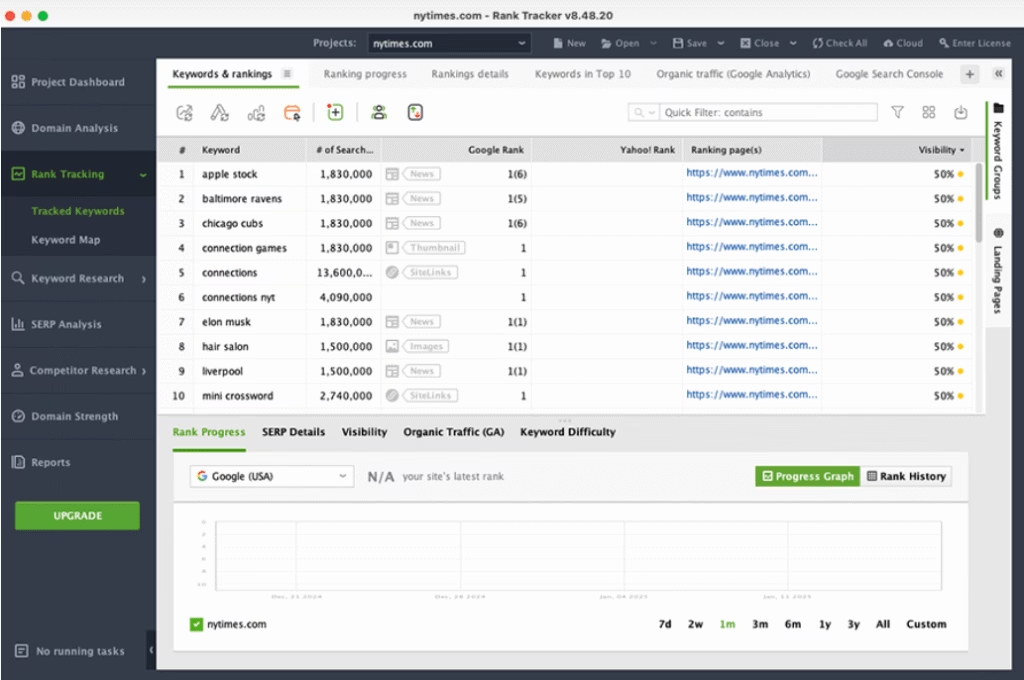
2. SEO PowerSuite WebSite Auditor
SEO PowerSuite WebSite Auditor is a desktop-based tool used for technical SEO analysis and on-page optimization. SEO PowerSuite WebSite Auditor crawls websites to identify issues like broken links, duplicate content, missing metadata, crawlability problems, and slow-loading pages. The SEO PowerSuite WebSite Auditor Tool checks site architecture, evaluates internal linking, and flags elements that might hinder search engine visibility.
The SEO PowerSuite WebSite Auditor dashboard provides visual representations of site structure, but large sites may take longer to crawl and can strain system resources. The SEO PowerSuite WebSite Auditor’s interface is functional but cluttered, with multiple tabs and options that can be difficult to navigate for new users or those expecting a streamlined experience.
The SEO PowerSuite WebSite Auditor dashboard includes an on-page SEO module that assesses content optimization based on keyword usage, HTML structure, and comparison with top-ranking pages. The SEO PowerSuite WebSite Auditor software checks for keyword stuffing, thin content, and non-optimized headings, and includes support for structured data and Core Web Vitals metrics. However, recommendations are generic and require manual interpretation before implementation.
The SEO PowerSuite WebSite Auditor does not have direct CMS integration, so fixes must be made separately within the website backend. While detailed, the audit results are not always prioritized by impact, which can make it difficult to identify which issues require immediate attention. Moreover, there is no automation for issue resolution, and all updates must be applied manually to the website. The scans must be rerun regularly for fresh data because the SEO PowerSuite WebSite Auditor is desktop-based, and it lacks the continuous monitoring available in cloud SEO platforms.
To conduct an SEO site audit using SEO PowerSuite WebSite Auditor, create a new project and enter the website URL to initiate a crawl. After configuring the crawl settings, the SEO PowerSuite WebSite Auditor scans the site and lists all technical and on-page issues found.
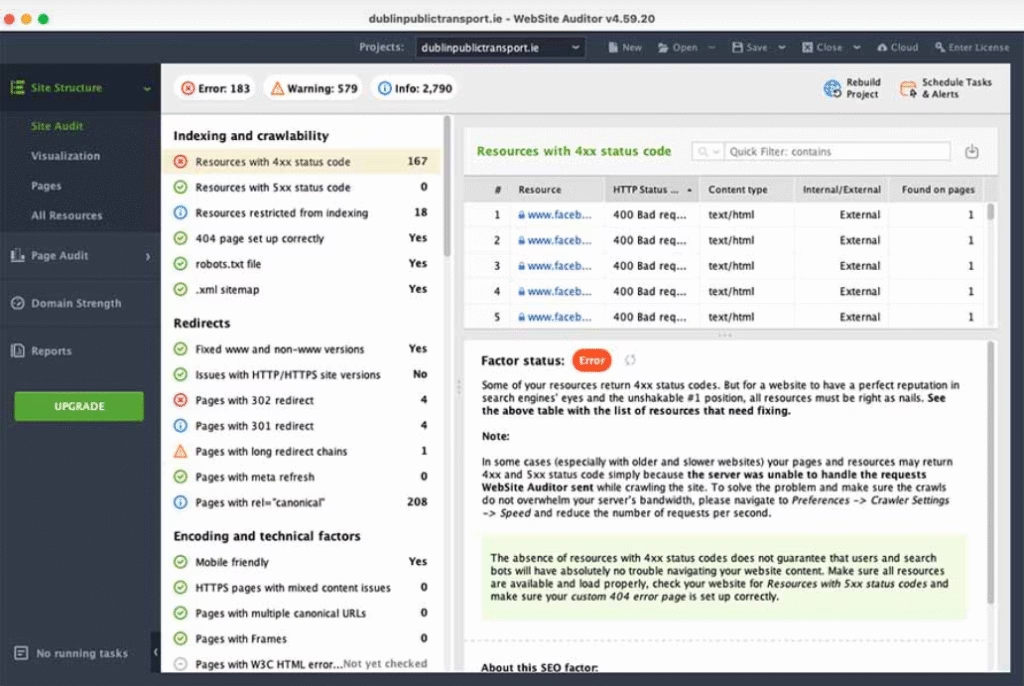
3. SEO PowerSuite SEO SpyGlass
SEO PowerSuite SEO SpyGlass is a desktop-based backlink analysis tool that scans and audits inbound links using its proprietary backlink index. SEO PowerSuite SEO SpyGlass reveals metrics like do-follow/no-follow status, anchor texts, domain authority, penalty risk, and historical backlink trends, all within a single interface. The SEO PowerSuite SEO SpyGlass Tool supports competitor backlink comparison and bulk audits, although reliance on local machine processing and Java can slow performance on larger projects.
The SEO PowerSuite SEO SpyGlass dashboard allows deep analysis of backlink profiles and uncovers link-building opportunities through competitor gap analysis and historical data tracking. Projects can source data from Google Analytics/Search Console and audit multiple domains simultaneously. Customizable reports and white-label exports add presentation value. However, feature access varies by long-standing plan tiers, and SEO PowerSuite SEO SpyGlass’s desktop nature makes it less flexible compared to cloud services. Additionally, audits may become sluggish and less effective on systems with limited RAM, despite good filtering and penalty risk tools.
To use SEO PowerSuite SEO SpyGlass, create a project and enter the target domain. Next, configure data sources like Google Analytics or Search Console. Initiate a backlink crawl to retrieve link metrics, then explore the domain overview, backlink profile, anchor-text, competitor comparison, and penalty indicators.
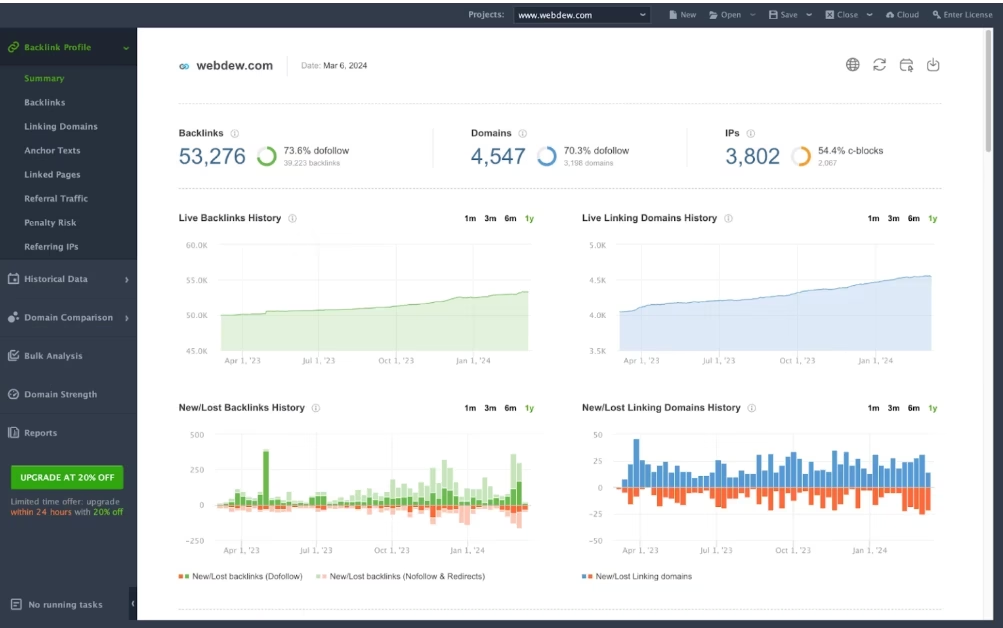
4. SEO PowerSuite LinkAssistant
Seo PowerSuite LinkAssistant is a desktop-based link-building application designed to discover backlink opportunities and manage outreach campaigns. SEO PowerSuite LinkAssistant automatically finds prospects using more than ten search methods, including competitor backlink analysis, topic-based searches, and manual expert queries.
The SEO PowerSuite LinkAssistant Tool evaluates each potential referring domain using metrics such as domain age, traffic, InLink Rank, and social popularity. Additionally, the SEO PowerSuite LinkAssistant dashboard identifies contact information, allowing users to run outreach campaigns through a built-in email client with customizable templates. While this one-stop approach covers much of the link acquisition process, the reliance on desktop infrastructure and lack of integration with modern CRMs may limit the SEO PowerSuite LinkAssistant’s utility for larger teams.
The SEO PowerSuite LinkAssistant software offers a smart prospecting feed with built-in browser preview and advanced filtering to separate high-quality leads from spammy or irrelevant ones. Moreover, the SEO PowerSuite LinkAssistant interface provides automated backlink validation, tracking whether links remain live or have changed attributes like nofollow tags. Reports can be exported or scheduled, making SEO PowerSuite LinkAssistant suitable for client delivery. However, outreach automation can feel rigid and lacks A/B testing or personalization features that are common in dedicated outreach platforms. Additionally, performance updates are incremental and desktop-only, with potential sluggishness when handling large prospect lists.
To use SEO PowerSuite LinkAssistant, begin by creating a project and entering your website URL, target country, language, and topic-specific exclusions. Then select one of the built-in prospecting methods, such as Guest Posting, Reviews, or Broken Link Recovery, and run a search.
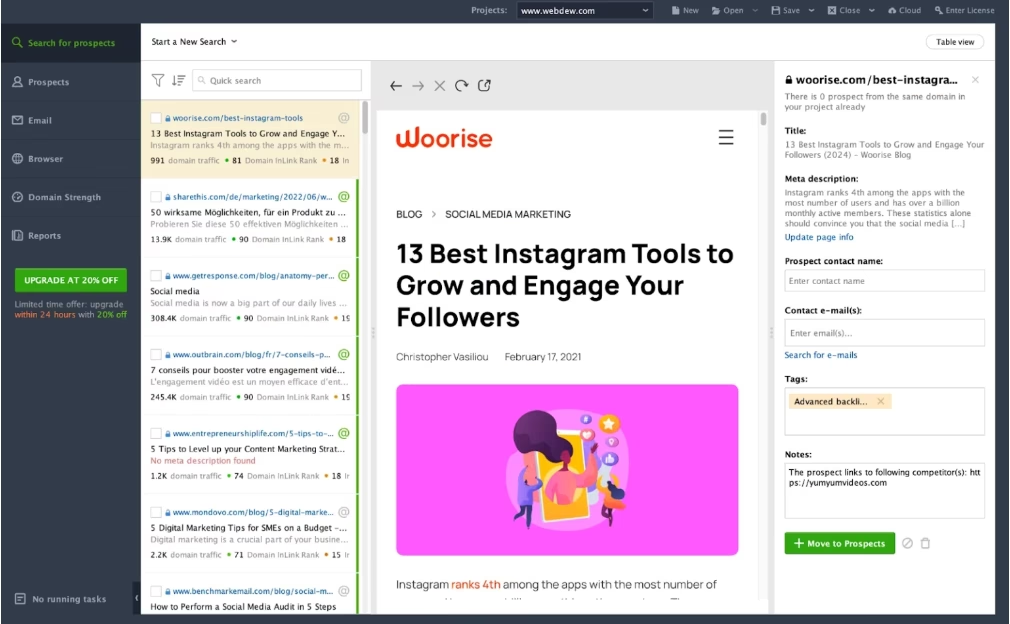
How does SEO PowerSuite Tool Work?
The SEO PowerSuite Tool works as a desktop-based suite offering four tools for keyword tracking, site auditing, backlink analysis, and link building. Each SEO PowerSuite tool runs as a separate application and requires users to create individual projects per website. Data is stored locally, and all scans or updates must be run manually or scheduled.
Users begin by launching an SEO PowerSuite tool, entering their domain, and configuring settings like search engines or crawl depth. The SEO PowerSuite tool then collects ranking data, audits site structure, analyzes backlinks, or finds link prospects. Reports are generated within the software and can be exported in various formats.
However, SEO PowerSuite’s reporting templates are rigid, and automation options are limited compared to modern SaaS platforms. The SEO PowerSuite’s interface is dated, cluttered, and often unintuitive, requiring users to spend time navigating multiple tabs for basic tasks. Moreover, the SEO PowerSuite dashboard lacks real-time syncing, cloud access, or collaborative features, making it less suitable for teams.
How Accurate is SEO PowerSuite Tool?
The SEO PowerSuite Tool is generally considered accurate for basic SEO tracking. However, several independent reviews have pointed out limitations in SEO PowerSuite’s accuracy and reliability. An evaluation by SE Ranking notes that while SEO PowerSuite supports unlimited position tracking, the accuracy of the reports may be questionable compared to services using larger, regularly updated data sets. This inconsistency can lead to discrepancies in ranking changes, making SEO PowerSuite unreliable for precision-focused SEO tasks.
Additionally, a 2023 review by MethodShop further questions SEO PowerSuite’s accuracy, with users describing the backlink and audit modules as less reliable and poor when compared to competitors. The review highlights delays in reporting and inconsistencies in keyword tracking as recurring issues. These assessments suggest that while SEO PowerSuite may provide broad functionality, its accuracy and consistency fall short, especially for teams needing dependable, real-time SEO intelligence.
What Pricing Plans Does SEO PowerSuite Tool Offer?
SEO PowerSuite’s pricing is structured across three main plans. The SEO PowerSuite Free version is permanently available. However, the SEO PowerSuite Free version comes with heavy restrictions, including no project saving, watermarked reports, and limited access to backlinks, competitors, and audit URLs. The Seo PowerSuite Free version is mainly suitable for casual users or one-time testing, as core features like exporting data and scheduling tasks are unavailable. The SEO PowerSite Free version offers broader access compared to free tiers from cloud-based competitors but lacks scalability and real usability for ongoing SEO work.
The SEO PowerSuite Professional plan costs around $60/month and removes most of the usage caps. The SEO PowerSuite Professional plan allows unlimited keyword tracking, backlink checks, and site audits, with support for multiple projects and task scheduling. However, reports still include watermarks and cloud storage is limited to just 20 projects. While suitable for freelancers or small teams, the SEO PowerSuite Professional plan does not support scheduled report delivery or white-label exports, which are features that are commonly included in similarly priced SaaS tools.
The SEO PowerSuite Enterprise plan costs around $140/month and is aimed at agencies needing white-label reporting and automated report delivery. The SEO PowerSuite Enterprise plan expands cloud storage to 400 projects but still lacks modern features like API access, CRM integration, and real-time collaboration. The SEO PowerSuite Enterprise plan competes with full-featured cloud platforms but with fewer automation and team collaboration options.
The SEO PowerSuite Tool may be worth it for individual users or small teams who prefer desktop-based SEO tools with one-time annual pricing. SEO PowerSuite’s broad feature set covers key SEO functions. However, the lack of real-time data, limited integrations, and the absence of cloud-based collaboration tools make SEO PowerSuite less practical for larger agencies or fast-paced environments. While SEO PowerSuite can handle core SEO tasks, its dated interface and slower workflow may hinder efficiency compared to more modern, cloud-native alternatives.
What is the SEO PowerSuite Tool Rating?
The SEO PowerSuite Tool receives varied ratings across different software review platforms. The varied feedback reflects SEO PowerSuite’s strong feature set while highlighting concerns about usability, speed, and outdated design. The SEO PowerSuite reviews across major software review sites are listed below.
- Trustpilot. 4.3 / 5 (416 reviews)
- Capterra. 4.5 / 5 (379 reviews)
- G2. 4.5 / 5 (553 reviews)
- TrustRadius. 9.8 / 10 (41 reviews)
- Gartner Peer Insights. 4.3 / 5 (4 reviews)
The ratings reflect a tool that offers comprehensive features but falls short in user experience, real-time collaboration, and the flexibility expected from modern SEO platforms. SEO PowerSuite users highlight the tool’s broad features. At the same time, SEO PowerSuite users point to challenges around slow performance, lack of cloud access, limited automation, and a steep learning curve for new users.
What are the Pros of SEO PowerSuite?
SEO PowerSuite offers a few pros, particularly for users who prefer offline tools and value one-time licensing over monthly subscription models. The pros of SEO PowerSuite are discussed below.
- Comprehensive Feature Coverage. SEO PowerSuite offers keyword tracking, technical auditing, backlink analysis, and link prospecting, all integrated within four tools under one software suite.
- No Usage Limits. Users can track unlimited keywords, audit entire websites, and analyze extensive backlink data without hitting hard caps or needing additional credits.
- Custom Reporting Options. SEO PowerSuite reports can be exported in multiple formats, including PDF and HTML, and partially customized for internal or client-facing use.
- Local SEO Tracking Precision. SEO PowerSuite Rank Tracker allows monitoring down to specific cities and even street-level locations, which can support local campaign accuracy.
- Google Integration. SEO PowerSuite connects to Google Analytics and Search Console, although setup requires manual authentication and may not sync in real-time.
- Offline Access. Users can access projects without internet connectivity since SEO PowerSuite is a desktop tool. However, collaboration and syncing are not possible.
- Free Version Available. SEO PowerSuite’s forever-free plan allows basic access to all four tools, although project saving and export functions are heavily restricted.
- Decent Link Intersection Feature. SEO PowerSuite SEO SpyGlass includes a basic but functional tool to compare backlinks across multiple competitors. However, the tool is less advanced than cloud-based alternatives.
These pros make SEO PowerSuite a viable option for certain users. Still, most benefits of SEO PowerSuite are undercut by an outdated interface, slower workflows, and minimal automation.
What are the Cons of SEO PowerSuite?
SEO PowerSuite comes with several notable cons that can impact its usability, scalability, and data accuracy. The cons of SEO PowerSuite are discussed below.
- Desktop-Only Software. All SEO PowerSuite tools must be installed locally, which limits access across multiple devices and complicates team collaboration.
- Outdated User Interface. The SEO PowerSuite’s interface feels cluttered and unintuitive, requiring users to navigate multiple tabs for tasks that are simpler elsewhere.
- Lacks Real-Time Data Syncing. Updates in SEO PowerSuite must be manually triggered, and reports do not automatically reflect the latest rankings or crawl data.
- No Automation for Fixes. The SEO PowerSuite software can identify SEO issues, but cannot implement changes or integrate with CMS platforms for faster action.
- Limited Integrations. SEO PowerSuite does not offer native support for CRM, Slack, Trello, or other productivity tools commonly used in SEO workflows.
- Resource-Heavy Performance. SEO PowerSuite’s Java-based architecture can cause lag or crashes when processing large websites, especially on lower-spec machines.
- Small Backlink Database. SEO PowerSuite’s SEO SpyGlass uses a proprietary link index that is smaller and less frequently updated than other tools in the market.
- Confusing Pricing Structure. Some features in SEO PowerSuite are only available at higher tiers, and unclear upgrade prompts may frustrate users during setup.
- Rigid Report Templates. SEO PowerSuite’s reporting lacks advanced customization and visual dashboard options found in more dynamic, cloud-native SEO tools.
- Poor Keyword Research Features. SEO PowerSuite’s Rank Tracker lacks built-in keyword databases and detailed difficulty scores, making its research tools weaker than leading alternatives.
While SEO PowerSuite may meet the needs of cost-conscious users with simple workflows, its limitations in speed, integration, and usability make it less competitive overall.
What do Reddit Users think about SEO PowerSuite?
Reddit users express mixed views on SEO PowerSuite. A few Reddit users admit SEO PowerSuite can be a passable entry-level tool for beginners or hobbyists working in low-competition niches. SEO PowerSuite’s low upfront cost and unlimited keyword tracking are attractive to some, especially those unwilling or unable to pay monthly SaaS fees. However, other Reddit users often recommend transitioning to more advanced platforms as soon as budgets allow.
A recurring sentiment among Reddit users is that while SEO PowerSuite may have been competitive over a decade ago, it has not evolved fast enough to meet the current demands of the SEO landscape. Reddit users frequently mention that SEO PowerSuite’s outdated desktop-based design and lack of real-time data make it inefficient for anyone managing more than a single small site. Several long-time users commented that SEO PowerSuite was once a solid option but has since been surpassed in almost every meaningful category.


A frequent complaint among Reddit users relates to SEO PowerSuite’s performance issues. Reddit users point out that SEO PowerSuite is resource-intensive, requiring substantial RAM and system resources to perform basic tasks such as rank tracking or site audits. Reddit users report that audits for large websites can take hours or even days to complete because SEO PowerSuite is built in Java and runs locally. This makes SEO PowerSuite unsuitable for agencies or professionals working across multiple domains.


Another area of criticism is SEO PowerSuite’s fragmented interface and poor user experience. SEO PowerSuite is divided into four separate applications, and Reddit users often describe the experience as clunky and unintuitive. Some Reddit users noted that seemingly basic actions, like saving files to cloud services, are restricted due to the use of a proprietary file system. Additionally, having to operate each tool individually and not being able to sync projects across devices makes workflows inefficient, especially in team environments.

Reddit users acknowledge that SEO PowerSuite may still offer some utility for beginners or those managing a single, low-competition website. However, the overwhelming consensus on Reddit is that SEO PowerSuite lags behind modern SEO platforms in performance, usability, and data accuracy.
How does SEO PowerSuite treat its Long-term Subscribers?
SEO PowerSuite’s treatment of its long-term subscribers has sparked frustration and backlash over time. SEO PowerSuite does not offer loyalty programs or long-term subscriber benefits that are common with modern SaaS tools. Long-time SEO PowerSuite users are not grandfathered into older, more generous pricing tiers. Instead, many SEO PowerSuite users report being required to pay annual search algorithm update fees, even after purchasing what was marketed as a lifetime license. This practice has led to frustration among early adopters who feel misled by the initial pricing model and its long-term implications.
Moreover, there are no formal loyalty discounts or account-based upgrade incentives for SEO PowerSuite customers who have used the product for years. Some users have pointed out that even basic algorithm updates are locked behind paywalls, and failure to pay results in tools not functioning properly. This means that to retain full functionality, long-term SEO PowerSuite users must continue to pay, essentially turning the tool into a subscription, despite the original promise of one-time pricing.
Additionally, SEO PowerSuite does not appear to reward early users with additional cloud storage, advanced features, or legacy benefits. SEO PowerSuite applies the same pricing rules across the board, unlike platforms that grandfather in long-term users with feature access or discounted renewals. This lack of recognition has been a consistent point of criticism across user reviews and forums.
How Responsive is SEO PowerSuite’s Customer Support?
SEO PowerSuite’s customer support is often described as slow and inconsistent by users across Reddit and review platforms. SEO PowerSuite offers live chat and email support. However, many SEO PowerSuite users report waiting several days for email responses, even for urgent technical or billing issues. Additionally, SEO PowerSuite users frequently note that responses are generic and do not always address the core issue directly.
SEO PowerSuite has no dedicated support portal with real-time ticket tracking, which adds to user frustration when dealing with complex or recurring problems. Some long-time users mention that even with paid subscriptions, there is no priority support or escalation option available.
Several SEO PowerSuite customers complain about receiving little to no help when disputing billing issues such as unexpected auto-renewals or update charges. This has led to trust concerns, particularly among those who purchased the SEO PowerSuite platform under the assumption of lifetime access. While a few users have praised the SEO PowerSuite support team for being helpful in specific cases, the overall sentiment is negative, with many users expressing dissatisfaction due to slow, inconsistent, or unhelpful responses.
How Reliable and Legit is SEO PowerSuite as an SEO Tool?
SEO PowerSuite is generally regarded as a reliable and legitimate SEO tool with functional capabilities. However, many SEO PowerSuite users express dissatisfaction with the company’s business practices, citing a lack of pricing transparency and unexpected charges. The recurring fees for essential updates, even after purchasing a lifetime license, are a common point of contention. Additionally, some users report being charged without adequate renewal warnings and receiving minimal support when requesting refunds or clarifications. These practices have led a portion of the SEO PowerSuite user base to question the platform’s integrity, with a few even labeling the tool a scam.
What is the Best Alternative to the SEO PowerSuite Tool?
The best alternative to the SEO PowerSuite Tool is the Search Atlas SEO Software Platform. The Search Atlas SEO Software Platform is a US-based SaaS company that provides powerful SEO tools designed to support marketing professionals, agencies, and businesses of all sizes around the world. The Search Atlas SEO Software Platform delivers cost-effective, user-friendly solutions to help improve online visibility, drive traffic, and grow your digital presence.
The Search Atlas SEO Software Platform offers a revolutionary approach to SEO that combines advanced AI automation with traditional SEO tools. The Search Atlas SEO Software Platform delivers a comprehensive SEO suite that includes in-depth backlink and keyword research, AI-powered content tools, on-page and technical audits, competitor tracking, rank monitoring, and outreach automation, with seamless GSC, Google Analytics, and Google Business Profile integration.
The Search Atlas SEO Software Platform’s game-changing OTTO SEO Tool serves as an in-house SEO strategist, recommending tailored tasks to optimize your website, grow your keyword rankings, and improve your technical SEO health. OTTO SEO Tool can help automate technical SEO, content optimization, and more, providing users with a dedicated AI assistant that works continuously to enhance their SEO performance without manual intervention.
The Search Atlas SEO Software Platform starts at $99 per month and offers flexible pricing plans that cater to different needs and budgets, making it a cost-effective choice for professionals and agencies of all sizes. Additionally, the Search Atlas SEO Software Platform offers white-label solutions for agencies and is trusted by 5,000+ digital marketers and agencies to optimize their workflows. With its combination of AI-powered automation, comprehensive toolset, and proven results, the Search Atlas SEO Software Platform represents the future of intelligent SEO management.
Ready to switch to a smarter, all-in-one SEO platform? Migrate from SEO PowerSuite to Search Atlas SEO Software Platform today and unlock advanced tools for backlink analysis, AI content optimization, and outreach, without overpaying.
Are there any other SEO PowerSuite Alternatives?
Yes, there are several strong SEO PowerSuite alternatives that cater to different SEO needs and budgets. SEO tools like the Search Atlas SEO Software Platform, SE Ranking, Serpstat, Ahrefs, Moz, SpyFu, and SimilarWeb are often preferred for their real-time data, automation features, better collaboration options, and broader integration with other platforms. These SEO PowerSuite alternatives come with their strengths and weaknesses, so the right choice depends on your specific SEO goals and budget.
Do SEO Professionals rank SEO PowerSuite among the best SEO tools?
Yes, many SEO professionals consider SEO PowerSuite among the best SEO tools, particularly for beginners or those on a budget. However, some SEO professionals prefer other SEO tools for better accuracy, speed, and collaboration features.


